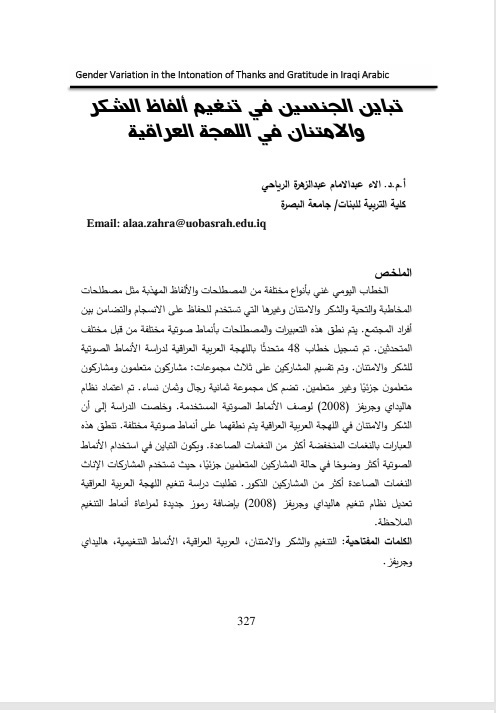تباين الجنسين في تنغيم ألفاظ الشكر والامتنان في اللهجة العراقية
محتوى المقالة الرئيسي
الملخص
الخطاب اليومي غني بأنواع مختلفة من المصطلحات والألفاظ المهذبة مثل مصطلحات المخاطبة والتحية والشكر والامتنان وغيرها التي تستخدم للحفاظ على الانسجام والتضامن بين أفراد المجتمع. يتم نطق هذه التعبيرات والمصطلحات بأنماط صوتية مختلفة من قبل مختلف المتحدثين. تم تسجيل خطاب 48 متحدثًا باللهجة العربية العراقية لدراسة الأنماط الصوتية للشكر والامتنان. وتم تقسيم المشاركين على ثلاث مجموعات: مشاركون متعلمون ومشاركون متعلمون جزئيًا وغير متعلمين. تضم كل مجموعة ثمانية رجال وثمان نساء. تم اعتماد نظام هاليداي وجريفز (2008) لوصف الأنماط الصوتية المستخدمة. وخلصت الدراسة إلى أن الشكر والامتنان في اللهجة العربية العراقية يتم نطقهما على أنماط صوتية مختلفة. تنطق هذه العبارات بالنغمات المنخفضة أكثر من النغمات الصاعدة. ويكون التباين في استخدام الأنماط الصوتية أكثر وضوحًا في حالة المشاركين المتعلمين جزئيًا، حيث تستخدم المشاركات الإناث النغمات الصاعدة أكثر من المشاركين الذكور. تطلبت دراسة تنغيم اللهجة العربية العراقية تعديل نظام تنغيم هاليداي وجريفز (2008) بإضافة رموز جديدة لمراعاة أنماط التنغيم الملاحظة.
تفاصيل المقالة

هذا العمل مرخص بموجب Creative Commons Attribution-ShareAlike 4.0 International License.
المراجع
References
-Abdul Kadhum, Y. (2016). A Socio-Pragmatic Analysis of Politeness in Male and Female Language in Oprah Winfrey’s Talk Show “Selected Interviews with Some Movie Stars”. Unpublished M. A. Thesis, Al-Mustansiriya University.
-Boubendir, F. (2012). Linguistic Politeness in English and Arabic and its Implications forTranslation. An Unpublished M. A. Thesis, the University of Petra.
-Daly, N. and Warren, P. (2001). Pitching it Differently in New Zealand English: Speaker Sex and Intonation Patterns. Journal of Sociolinguistics, Vol. 5, No. 1, pp. 85-96.
-Ghalib, G. (1984). An Experimental Study of Consonant Gemination in Iraqi Colloquial Arabic. Unpublished Ph.D. The University of Leeds.
-Grainger, K., Kerkam, Z., Mansor, F. and Mills, S. (2015). Offering and Hospitality in Arabic and English. Journal of Politeness Research, Vol. 11, No.1, pp.41-70.
- Habeeb, R. and Jawad, R. (2013). Strategies of Accepting Invitations and Offers in Arabic and English: A Cross-cultural Study. Tikrit University Journal for Humanities, Vol. 20, No. 12, pp. 20-54.
-Halliday, M. and Greaves, W. (2008). Intonation in the Grammar of English. UK: Equinox Publishing Ltd.
-Holmes, J. (1995). Women, Men and Politeness. London, Longman.
- Holmes, J. (2013). An Introduction to Sociolinguistics (4th Ed.). London and New York: Routledge Taylor and Francis Group.
-Holmes, J. and Meyerhoff, M. (Eds). (2003). The Handbook of Language and Gender. Oxford: Blackwell Publishing Ltd.
-Jasim, M. (2017). Refusals of Requests and Offers in Iraqi Arabic and British English.
Unpublished Ph.D. Thesis. University of Manchester: School of Arts, Languages and Cultures.
-Jiang, H. (2011). Gender Differences in English Intonation. ICPhS, Vol. XVII, pp. 974-977.
-Laplante, D. and Ambady, N. (2003). On How Things are Said: Voice Tone, Voice Intensity,
Verbal Content, and Perceptions of Politeness. Journal of Language and Social
Psychology: Sage Publications. Vol. 22, No. 4, pp. 434-441.
- McConnell-Ginet, S. (2011). Gender, Sexuality and Meaning: Linguistic Practice and Politics.
Oxford: Oxford University Press.
- Noori, B. (2012). A Pragmatic Analysis of Polite Forms in English and Arabic: A Contrastive
Study. Al-Ustath, No. 203, pp. 75-85.
-Paltridge, B. (2006). Discourse Analysis: An Introduction. London and New York: Continuum.
-Scott, J. (Ed.). (2006). Sociology: The Key Concepts. London: Routledge.
-Samarah, A. (2015). Politeness in Arabic Culture. Theory and Practice in Language Studies, Vol.
, No. 10, pp. 2005- 2016.
-Versteegh, K. (2014). The Arabic Language (2nd Ed.). UK: Edinburgh University Press Ltd.
- Wardhaugh, R. (2006). An introduction to sociolinguistics (5th Ed). Oxford: Blackwell Publishing.
